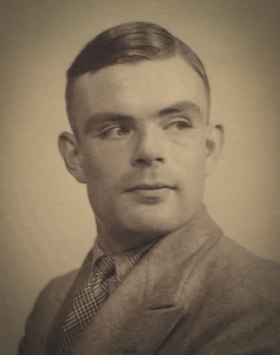The Alan Turing
Hosted by the Fundação Calouste Gulbenkian
The Alan Turing
Hosted by the Fundação Calouste Gulbenkian
Fundação Calouste Gulbenkian Auditório 3 (Lisboa, Portugal).
December 11, 2012 - 9h30 to 17h00.
Salk Institute, USA; Nobel Laureate in Physiology or Medicine 2002.
University of Florida, USA; author of The Man Who Knew Too Much: Alan Turing and the Invention of the Computer.
Indiana University, USA and Instituto Gulbenkian de Ciencia, Portugal
Universidade do Porto, Portugal
Portland State University, USA; author of Turing's Connectionism: An Investigation of Neural Network Architectures and Alan Turing: Life and Legacy of a Great Thinker.
Invited Speakers
NEWS!
Videos of the entire event are available here.
Alan Turing was born on June 23, 1912. His work was ground-breaking in computer science and most influential in many areas such as biology, cognitive science, logic, and cryptography. It is fair to say that his work enabled the computing revolution which has been the greatest engine of change in Humanity in the last 50 years or more. Certainly, the impact of his work is at least on par with the greatest scientists of all time such as Darwin, Newton, or Einstein. Furthermore, his role in the allied war effort gives us a relevant example of the historical role of scientists in the defence of modern societies. But his death also gives us much to ponder about the nature of human beings and the justice systems put in place to restraint diversity and sexual freedom.
The aim of this symposium is to mark this occasion and discuss Turing’s legacy. It is organized as an interdisciplinary series of lectures by scholars dealing with the various aspects of Turing’s work: Computer Science, Biology, Mathematics, Cognitive Science, Cryptography, History, and Society. We hope that this event can foster dialog from multiple disciplines and provide Portuguese society with a better understanding of the impact and legacy of Turing’s life and work.
“at the core of everything [in life] are the tapes containing the descriptions to build these special Turing Machines”
Sydney Brenner
Symposium schedule
9:30 - 9:45 – Opening: João Queiró, Secretário de Estado do Ensino Superior and Diogo de Lucena, Administrador Fundação Calouste Gulbenkian
9:45 – 10:45 – Sydney Brenner – “The Architecture of Biological Complexity”
10:45 – 11:15 – Coffee Break
11:15 – 12:15 – Luis M. Rocha – “Turing’s Tape and the Cybernetics of Biocomplexity”
12:15 – 13:15 – Cristof Teuscher – “Artificial Brains: From Turing to Kurzweil and onward”
13:15 – 14:30 – Lunch
14:30 – 15:30 - António Machiavelo - "Turing and the Enigma Cipher"
15:30 – 16:30 – David Leavitt – “Alan Turing's Modesty and His Genius”
16:30 - closing – Luís Moniz Pereira, Universidade Nova de Lisboa and Leonor Parreira Secretária de Estado da Ciência (Portugal)
For additional information contact the symposium chair Luis M. Rocha
